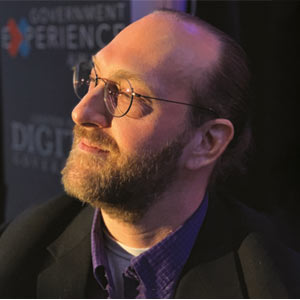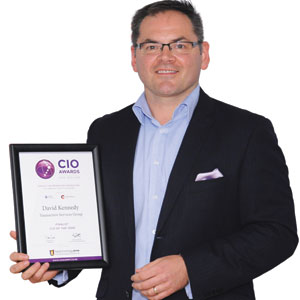THANK YOU FOR SUBSCRIBING

How the New CIO Adds Value to Smart City Projects
Fred Ellermeier, VP & Managing Director, Black & Veatch


Fred Ellermeier, VP & Managing Director, Black & Veatch
Communities all over the world are getting smarter and benefitting from greater connectivity. But an interesting trend has emerged to make cities smarter: A handful of cities in the U.S. are establishing a new kind of CIO – a Chief Innovation Officer, who is devoted solely to deploying the technology that helps communities operate more efficiently.
Smart city benefits are easy enough to communicate. From advancements in public transportation, public safety, sustainability and more, Smart city efforts can be transformational in improving the lives of citizens. Creating a roadmap for that transformation and knowing where to start, however, can be a challenging task.
It’s helpful to think of the smart city as an ecosystem, driven by partners who can best define priorities and envision solutions to citizen needs. Managing these partnerships and fostering ongoing collaboration is foundational to creating value and justifying smart investments. Data plays a key role in the ecosystem as well, and understanding and optimizing this data is critical to project success.
It’s why leaders in Austin, Texas; Columbus, Ohio and Kansas City, Missouri, are streamlining management of these dynamics through a CIO who can network and holistically plan smart city efforts from the ground up. This role acts as a sort of high-beam headlight scanning the future horizon: What technology will be available, and how can it integrate across the city landscape to meet community demand, and how will the city work creatively and collaboratively to accomplish technology implementation?
Using Data for Comprehensive Master Planning
According to survey responses from the Black & Veatch 2017 Strategic Directions: Smart City/Smart Utility Report, planning and funding smart city initiatives remain the largest areas of concern for community service providers. In fact, the top three hurdles to enabling systems to be managed in a more integrated and intelligent way were budget constraints, lack of resources or expertise and public policy.
Municipalities have always promoted the idea of long-term planning, but have traditionally lacked a focal figure like a CIO that can take the lead on smart city master planning. A CIO can link data with existing infrastructure to develop a comprehensive master plan and tangibly convey the benefits of smart upgrades. Surprisingly, less than a third of survey respondents consider data management critical to their smart city initiatives, validating the need for a more panoramic view of the value digital solutions offer in this technological age.
What is slightly more encouraging is that 41 percent of respondents said they already have enhanced data management/sharing/analytics capabilities to assist in city/community operations.
A CIO can link data with existing infrastructure to develop a comprehensive master plan and tangibly convey the benefits of smart upgrades
Cities have used data for years, but modern data management should also capture operations and maintenance analytics, which can be compared with predictive analytics and historical data. CIOs can work with utilities, other service providers and community stakeholders to create a master plan using these detailed analyses to not only identify the most suitable applications, but also the systems that support those solutions.
Collaborating to Meet Citizen Demand
While data will always be a focal point in the smart city, engaging with the many stakeholders – citizens, city leadership, utilities, universities, service providers and technology providers – will also be crucial. Early adopters have looked to alternative financing such as public-private partnerships to fund these efforts which provide opportunities for greater engagement. Three-quarters of all survey respondents indicated that public-private partnerships are the most effective financing model for smart city initiatives, reinforcing the importance of stakeholder collaboration.
In some cases, it isn’t always just about a particular CIO’s role, but about innovative collaboration within city leadership. Chula Vista, California, for example, is managing public and private funding through a consortium of partners to plan a Bayfront development project that will incorporate smart technologies. City officials have worked with integrators such as Black & Veatch as well as technology providers and local entities to ensure an innovative and cohesive solution. Simultaneous engagement with all parties at the onset of project development ensures the infrastructure foundation is sound and can scale up for future technology needs.
It is important that CIOs lead the charge in greater stakeholder collaboration regardless of funding mechanism. In San Antonio, Texas, that city’s CIO launched a series of workshops and meetings that brought together non-profit agencies, educational institutions, military groups and local utilities to discuss current challenges and which resources could help the city become more sustainable.
Adding Value to Help Fund Smart Efforts
The CIO can play an integral role in helping stakeholders understand how smart initiatives create opportunities to generate revenue and get buy-in from city leadership. For example, property taxes are an often overlooked source of financing for smart city investments. Only 5 percent of municipalities—compared to nearly a quarter of smart service providers—view this as a viable option. CIOs can bridge this gap by educating both community officials and taxpayers about how an incremental raise in taxes could benefit citizens long-term. Smart city projects make communities more attractive, entice businesses and lead to new residents. The prospect of increased economic development and new revenue streams will drive interest in smart city development from city officials.
CIOs Bring the Smart City Vision to Life
The digital infrastructure at the core of a smart city will need to be planned and executed holistically, with scalability in mind. Smart cities are built in layers that include device and component level technology, a robust communication layer, and the digital application layer. Managing the plethora of components that make up this ecosystem can be overwhelming, but can lead to more efficient and economical systems and improved quality of service from community providers. Some cities are already benefitting from a Chief Innovation Officer who understands and navigates this landscape to plan and manage their smart transformation.
It is easy to get caught up in the numerous technological applications available. CIOs can help bridge gaps between available and field-ready technology to help all parties better understand which solutions are best for the community. However, the collaboration needed to further smart city initiatives does not fall on the CIO alone. Technology vendors, integrators, private sector and community providers such as utilities and government agencies will need to closely collaborate to achieve beneficial and sustainable smart city outcomes.
Check Out : Top Smart City StartupsWeekly Brief
I agree We use cookies on this website to enhance your user experience. By clicking any link on this page you are giving your consent for us to set cookies. More info
Read Also













